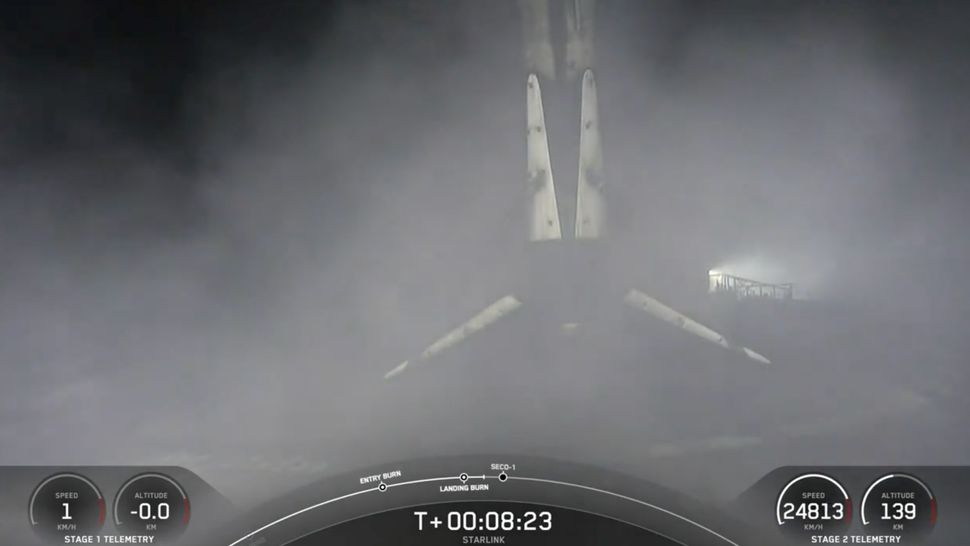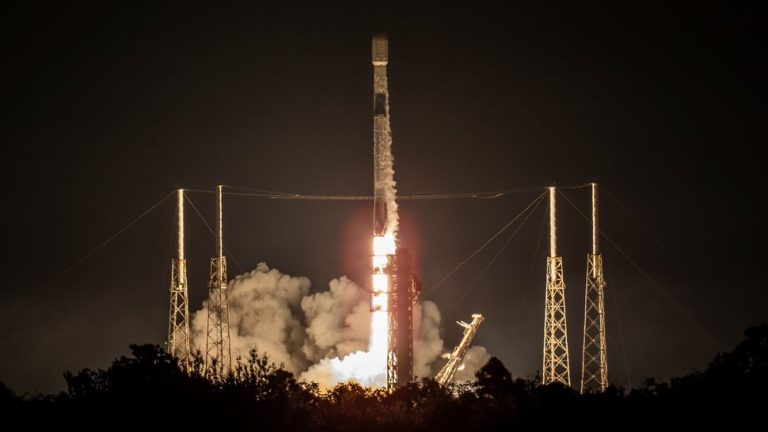SpaceX Launches Two Starlink Missions in Quick Succession: Back-to-Back Success
SpaceX successfully launched two Falcon 9 rockets within five hours, deploying Starlink satellites from both coasts. The launches marked a swift recovery from a previous failure on July 11. Both missions achieved full success, with all satellites deployed into low Earth orbit. The rapid succession of launches demonstrated SpaceX’s operational efficiency and resilience.
Summary
- Two Falcon 9 launches occurred on July 28, 2024, less than five hours apart.
- First launch: 1:09 a.m. EDT from Cape Canaveral Space Force Station, Florida, carrying 23 Starlink satellites.
- Second launch: 5:22 a.m. EDT from Vandenberg Space Force Base, California, carrying 21 Starlink satellites.
- Both missions were successful: rockets’ first stages landed on ships at sea, and satellites were deployed as planned.
- July 27 launch: marked the return-to-flight mission after a July 11 failure.
- July 11 failure: due to a liquid oxygen leak in the upper stage, caused by a cracked pressure sensor line.
- Corrective measures: SpaceX removed the faulty sensor and implemented alternatives to prevent recurrence.
- Operational milestone: 14th mission for the Falcon 9 first stage and the 300th reflight of a SpaceX booster.

Main Article
SpaceX has demonstrated remarkable resilience and operational efficiency by launching two Starlink missions within five hours on July 28, 2024. This back-to-back success marked a significant recovery after a launch failure earlier in the month.
The Launches
The first launch occurred at 1:09 a.m. EDT from Cape Canaveral Space Force Station in Florida. A Falcon 9 rocket, topped with 23 Starlink satellites, lifted off smoothly. This mission was the 14th for this Falcon 9 first stage, highlighting SpaceX’s commitment to reusability and cost-effectiveness. The company celebrated the 300th reflight of a SpaceX booster with this mission, showcasing their advancement in rocket technology.
Less than five hours later, at 5:22 a.m. EDT, another Falcon 9 rocket launched from Vandenberg Space Force Base in California. This mission carried 21 Starlink satellites, 13 of which have the capability to beam service directly to cell phones, broadening the scope of SpaceX’s satellite internet service.
Both missions were executed flawlessly. The first stages of the rockets landed precisely on drone ships stationed at sea, and the upper stages deployed the satellites into their intended low Earth orbits.
Swift Recovery from July 11 Failure
This operational success came after a setback on July 11, when a Falcon 9 launch failed due to a liquid oxygen leak in the upper stage. The leak was traced to a crack in a pressure sensor line, preventing the rocket from performing an orbit-raising burn. Consequently, the 20 Starlink satellites onboard were deployed into lower orbits than planned.
SpaceX’s quick investigation and corrective measures ensured that the problem would not recur. According to a company update on July 25, the faulty sensor and sense line were removed from the second-stage engine for near-term launches. Alternate sensors already present on the engine were used to cover the removed sensor’s functions, ensuring flight safety and reliability.
Achievements and Milestones
The rapid succession of these launches underscores SpaceX’s capability to handle and rectify technical issues promptly while maintaining an ambitious launch schedule. The July 28 launches marked several milestones:
- 14th mission for the Falcon 9 first stage: demonstrating its reusability.
- 300th reflight of a SpaceX booster: a testament to the durability and reliability of their rockets.
- Deployment of satellites with direct-to-cell capability: expanding the functionality of the Starlink constellation.
These achievements not only highlight SpaceX’s technological prowess but also its operational resilience and adaptability.
Detailed Breakdown
| Mission | Launch Time (EDT) | Launch Site | Payload | First Stage | Landing Site |
|---|---|---|---|---|---|
| First Launch (July 28, 2024) | 1:09 a.m. | Cape Canaveral Space Force Station, Florida | 23 Starlink satellites | 14th mission | Drone ship at sea |
| Second Launch (July 28, 2024) | 5:22 a.m. | Vandenberg Space Force Base, California | 21 Starlink satellites | – | Drone ship at sea |
Future Implications
The success of these missions has several implications for SpaceX and the broader aerospace industry:
- Increased Confidence in Reusability: The repeated use of Falcon 9 first stages underscores the viability of reusable rocket technology, paving the way for more cost-effective space missions.
- Enhanced Satellite Internet Coverage: The deployment of Starlink satellites with direct-to-cell capability can significantly improve global internet connectivity, particularly in remote and underserved areas.
- Operational Efficiency: The ability to conduct multiple launches in quick succession showcases SpaceX’s operational maturity, setting a high standard for launch cadence and reliability.
Technical Specifications
| Component | Specification |
|---|---|
| Falcon 9 Rocket | Two-stage reusable rocket |
| Payload | Starlink satellites |
| First Stage | 14th mission (1st launch), reusable |
| Second Stage | Equipped with alternate sensors |
| Landing Site | Drone ships at sea |
| Launch Sites | Cape Canaveral, Vandenberg Space Force Base |
Conclusion
SpaceX’s successful launch of two Falcon 9 rockets within five hours on July 28, 2024, represents a significant achievement in space exploration and satellite deployment. This back-to-back success not only showcases the company’s technical prowess and resilience but also reinforces the potential of reusable rocket technology in making space more accessible and cost-effective. The rapid recovery from the July 11 failure and the flawless execution of these missions highlight SpaceX’s commitment to innovation and excellence in the aerospace industry.
Sources
- SpaceX Updates: Falcon 9 Returns to Flight
- SpaceX Status Update on X (Twitter) – 1817506251670180025
- SpaceX Status Update on X (Twitter) – 1817444496197464149
Hashtags:
#SpaceX, #Starlink, #Falcon9, #SatelliteLaunch, #ElonMusk, #SpaceExploration, #Aerospace, #RocketTechnology

